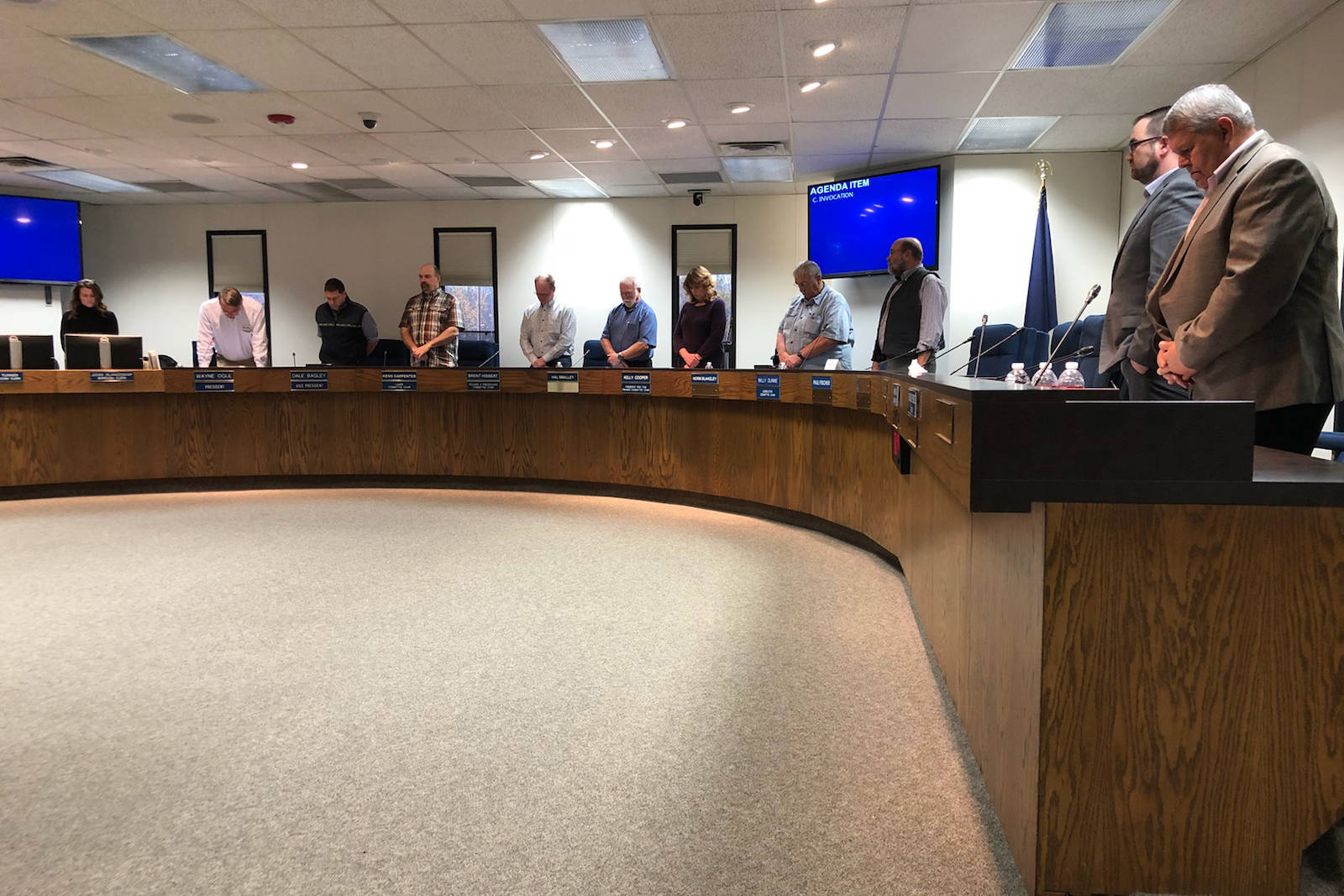The Alaska Superior Court has ruled against the Kenai Peninsula Borough in a fight over its controversial invocation policy, finding that the policy violates the Alaska Constitution.
In Hunt et al. v. Kenai Peninsula Borough, the Superior Court has ruled that the borough’s invocation policy violates the establishment clause, which refers to the mandate in the Constitution banning the government from establishing an official religion or favoring one religion or belief over another.
The borough had claimed that a resolution passed by the borough assembly — which allows a chaplain serving the military, law enforcement agencies, fire departments, hospitals or other similar organizations to give invocations before Kenai Peninsula Borough Assembly meetings, as well as people who are members of a religious organization with an “established presence” in the borough that meets regularly — was inclusive of all religious groups. In today’s ruling, the Superior Court rejected that claim.
“The Resolution is inclusive of tax-exempt religious association(s) serving residents of the borough. It is not inclusive of every religious view or belief practiced by the residents of the Kenai Peninsula Borough,” the court decision states. “Plaintiffs Hunt, Fontana, and Boyer are all examples of borough residents whose religions values are excluded and disfavored by the Resolution.”
Lance Hunt, an atheist, Iris Fontana, a member of The Satanic Temple, and Elise Boyer, a member of the small Jewish community in Homer, all applied to give invocations after the policy was established in 2016. All three were denied because they did not belong to official organizations with an established presence on the peninsula.
“Plaintiffs allege that the invocation selection policy implemented through the Resolution violates the prohibition against the establishment of religion, denies them of their freedom of speech and freedom of association, and denies them of their entitlement to equal rights, opportunities, and protection,” the decision states.
The Superior Court ruled only on the establishment clause issue, and did not reach a decision on the free speech, freedom of association and equal protection claims because it disposed of the issue by ruling that the invocation resolution violated the Alaska Constitution.
A Homer man, Barrett Fletcher, started a chapter of the Church of the Flying Spaghetti Monster in January to test the borough’s invocation policy. When the borough assembly met in Homer on Sept. 18, Fletcher applied to deliver the invocation, but was denied because his chapter did not meet the resolution’s criteria. Fletcher was not part of the lawsuit.
“Essentially I’m glad the court upheld the constitution and I hope the Assembly will just drop the whole thing rather than fan (further) controversy,” Fletcher said in a message to the Homer News. “But the First Lower Congregation of Pastafarians will likely continue to have the occasional meeting just because it turns out to be (as His Noodliness, The Great Flying Spaghetti Monster intended) kind of fun.”
The borough assembly has for decades opened each meeting with a prayer from a member of the community, predominately Christian pastors. Those wishing to give invocations had to voluntarily sign up on a first come, first serve basis.
The invocation policy arose out of a larger discussion about the role of prayer at the public meetings. In 2016, borough residents started saying the invocations made them uncomfortable and suggested the borough do away with the practice entirely. An ordinance that would have eliminated the invocations was shot down before it could be introduced, so the assembly went in the other direction, deciding to let anyone from the community give one.
In August 2016, Fontana gave an invocation before an assembly meeting that ended with the words “Hail Satan,” which sparked more community outcry and conversation. Eventually, assembly members came to a consensus on a policy to guide how invocations could be given before meetings, and adopted its new policy in October 2016.
The policy restricted the ability to give an invocation to those who were members of an organization with an established presence on the peninsula, that “regularly meet for the primary purpose of sharing a religious perspective,” according to the resolution that set up the policy.
The borough has defended its policy based on the decision made in Town of Greece v. Galloway, a 2014 case in which the U.S. Supreme Court ruled that it did not violate the Constitution for government bodies to allow invocations before their meetings. But the Superior Court found the Greece policy did not have the restrictions of the borough resolution.
“The court held that sectarian invocations are constitutional so long as a policy of nondiscrimination is maintained,” the Alaska Superior Court wrote of the Greece case in its decision.
The Superior Court went on to find that “history and tradition support an inclusive invocation policy. Not one that is inclusive of “diverse religious association(s),” but rather one that is inclusive of every faith. The Resolution at issue here excludes minority faiths from participating in the invocation practice.”
The borough, represented by Anchorage-based attorney Kevin Clarkson, had filed for a partial summary judgment on three out of the four claims made by the plaintiffs.
The plaintiffs, represented by Eric Glatt of the Alaska Civil Liberties Union, then filed their own motion for a summary judgment on all four of their claims. A summary judgment can be granted when neither party disagrees about the facts of the case.
“The parties in this case agree that the material facts are not in dispute and the case should be resolved on summary judgment; they just disagree over the outcome,” the decision states.
Reach Megan Pacer at mpacer@homernews.com.

